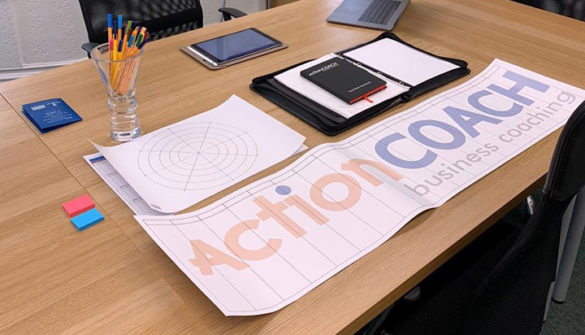Executive business coaching will cover a wide range of topics, but some of the most common areas of focus include:

- Leadership development
- Strategic planning
- Time management and productivity
- Communication and interpersonal skills
- Change management
- Decision making
- Delegation
- Problem-solving and critical thinking
- Team building and managing teams effectively
- Business and financial acumen
Leadership Development

An executive business coach can help leaders to develop their leadership skills and abilities through a variety of methods, including:
- Identifying leadership strengths and weaknesses: A coach can help leaders to identify their strengths and weaknessesas a leader by using assessments, surveys, and other tools, as well as through observation and feedback. This can provide a clear understanding of what they are doing well and what they need to improve upon.
- Training on specific leadership skills: A professional coach can provide training on specific leadership skills, such as communication, strategic thinking, decision-making, and crisis management. This can help leaders to develop the skills and knowledge they need to become more effective leaders.
- Development of leadership style:A leadership coach will help leaders to identify their leadership style by guiding how to define their values, vision, and purpose and how to align them with the organisation’s culture, goals and values. Additionally, an executive life coach can guide how to adapt the style to different situations, team members and stakeholders.
- Building a culture of accountability:A leadership coach London can help leaders create a culture of accountability within their team by providing guidance on establishing clear roles and responsibilities, setting expectations and providing feedback and recognition.
- Leading change:Performance coaches will help leaders to develop the skills and strategies needed to lead change within the organisation by guiding how to identify the need for change, how to assess the impact of the change, how to develop a change management plan, and how to lead the implementation of the change.
- Developing emotional intelligence:Leadership coaches can help leaders to develop their emotional intelligence by providing guidance on how to identify, understand and manage their own emotions and how to understand, influence and inspire the emotions of others. This can be critical for building strong relationships with team members, understanding the needs and motivations of others, and managing conflicts and difficult situations.

Executive business coaching for leadership development is tailored to the individual’s leadership style and the organisation’s specific context. Your coach will work closely with the leader to identify their strengths and areas for improvement and provide guidance and support throughout the process to help the leader reach their full potential.
Strategic Planning

Strategic planning is the process of defining an organisation’s direction and making decisions on allocating its resources to pursue this strategy. Business coaches can help executives develop and implement a strategic plan by assisting in several key areas:
- Defining the vision and mission:The coach can help leaders to develop a clear vision and mission for the organisation that aligns with the company’s values and purpose and communicates the organisation’s goals and aspirations to employees and stakeholders.
- Setting goals and objectives: The coach will help leaders to set specific, measurable, and attainable goalsand objectives that align with the organisation’s vision and mission. This can include short-term and long-term goals and objectives that align with different departments or business units.
- Identifying key performance indicators: The coach can help leaders to identify key performance indicators(KPIs) that will be used to measure progress towards achieving the organisation’s goals and objectives. This can include financial, customer, process, and employee-related metrics.
- Developing a plan of action:The coach will help leaders develop a plan of action, which outlines the steps needed to achieve the organisation’s goals and objectives, including timelines and resource allocation.
- Implementing and Monitoring:The coach will work with the leaders to implement the strategic plan by providing guidance on communicating it to the employees, aligning the teams and monitoring the progress against the plan.
- Review and adjustment:The coach will also assist in the review of the plan, checking if the goals were met, if the assumptions were correct and if the plan needs to be adjusted. This review process allows leaders to adapt the plan to changing conditions and to ensure that the organisation remains aligned with its vision and mission.

Strategic planning is a cyclical process that requires ongoing review, adaptation and improvement in response to changing external and internal conditions. The coach will work closely with the leaders to ensure the plan stays relevant and aligned with the organisation’s goals, providing guidance and support throughout the process.
Time Management

Time management and productivity are critical skills for executives and leaders, as they are often required to manage multiple tasks, projects, and responsibilities. A coach can help individuals to manage their time more effectively by identifying and addressing common time-wasters, such as multitasking, procrastination, and unproductive meetings, and developing strategies for staying focused and getting more done in less time.
- Setting clear goals:A coach will help individuals to set clear and specific goals for what they want to achieve and then develop a plan of action to achieve those goals. This can include breaking down larger tasks into smaller, manageable steps and setting deadlines for completing each step.
- Creating a schedule:A coach will help individuals create a schedule that aligns with their goals and priorities and allows them to allocate their time effectively. This can include scheduling time for specific tasks, meetings, and breaks and blocking out time for focused work and personal time.
- Breaking down tasks:A coach will help leaders break down larger tasks into smaller, manageable steps and provide guidance on prioritising and completing each step. This can help to reduce feelings of overwhelm and make it easier to stay focused and motivated.
- Using productivity tools:A coach will guide individuals to use productivity tools such as calendars, to-do lists, time-tracking apps, and project management tools to help them stay organised and on track.
- Learning to say no:A coach will help leaders learn how to say no to non-essential tasks and activities that do not align with their goals and priorities to focus on the most important tasks and achieve their objectives more efficiently.
- Managing energy: A coach will help leaders manage their energy levelsby providing guidance on how to maintain a healthy work-life balance, take regular breaks and manage stress. Maintaining a balance of physical, mental, and emotional energy can help leaders to avoid burnout and maintain their effectiveness over the long term.

Coaching for Time management and productivity is tailored to the individual needs and goals. It will involve the assessment of the current situation, identification of the constraints, and the development of a personalised plan of action to achieve the desired outcomes. The coach will provide guidance, support, and feedback throughout the process to help individuals stay on track and achieve their goals.
Communication and Interpersonal Skills

Effective communication and interpersonal skills are critical for leaders in any organisation, as they are essential for building strong relationships with team members, customers, and other stakeholders. A coach can help executives to improve their communication and interpersonal skills by focusing on several key areas:
- Listening:A coach can help leaders to improve their active listening skills, which involves listening to understand and respond, not just to reply. This can include techniques such as paraphrasing, reflecting and summarising to ensure a clear understanding of the message received.
- Negotiation:A coach can help leaders to develop their negotiation skills, which can be used in various situations, such as resolving conflicts, making deals or reaching agreements with partners, vendors or employees. A coach can provide guidance on how to prepare for negotiations, how to identify the interests of the parties involved, and how to create win-win solutions.
- Presentation:A coach can help leaders to improve their presentation skills, which can be essential for delivering effective sales pitches, giving speeches, or delivering reports to stakeholders. Coaching can include how to structure the content, how to use visual aids, how to handle questions and how to deliver the message clearly and convincingly.
- Building relationships:A coach can help leaders to build stronger relationships with their team members, customers, and other stakeholders, by providing guidance on how to communicate effectively, how to understand the needs and motivations of others, and how to build trust and rapport.
- Communication styles: A coach will help leaders to understand their own communication style, as well as the styles of others, and how to adapt their communication to different situations. Coaching can include identifying strengths and areas of improvement and learning how to adapt the message’s style, tone and content to the audience.

Coaching for communication and interpersonal skills is usually tailored to the individual’s needs, goals, and specific challenges. The coach will use a combination of assessment, training, role-playing, and feedback to help the individual identify strengths and areas of improvement and develop strategies for improving their communication and interpersonal skills in the workplace.
Change Management

Change management is a critical skill for executives and leaders, as organisations are constantly facing new challenges and opportunities that require them to adapt and evolve. Executive leadership coaching can help leaders develop the skills and strategies needed to manage change effectively within their organisation.
- Identifying the need for change: A coach can help leaders understand the reasons for change by assessing the organisation’s internal and external environment and identifying challenges, opportunities, and trends that may be driving the change.
- Assessing the impact of change:A coach can help leaders to assess the impact of the change on different stakeholders, including employees, customers, and partners. This includes identifying potential resistance and understanding the potential implications of the change on their roles, responsibilities and daily activities.
- Developing a communication plan:A coach can help leaders to develop a clear and effective communication plan, which outlines the key messages, audiences, and timing of the communications regarding the change. Coaching may include how to develop a change narrative, how to handle resistance and how to ensure the buy-in of the stakeholders.
- Training employees:A coach can help leaders develop training plans and materials to prepare employees for the change, including providing guidance on handling resistance and providing support and resources to help employees adapt to the new processes or procedures.
- Creating a clear roadmap:A coach can help leaders to develop a clear roadmap for change, which outlines the steps that need to be taken to achieve the desired outcomes. This can include identifying key milestones, timelines, and resources required and creating a plan for monitoring progress and addressing any issues that may arise.

Executive coaching in change management focuses on the individual’s leadership style and the organisation’s specific context. It is tailored to help leaders to understand the change, plan it and lead it in a way that aligns with the company’s vision and values. In addition, the coach will work with the leader to identify their strengths and areas for improvement and provide guidance and support throughout the process to ensure the successful implementation of change.
Decision Making

Decision-making is a critical skill for executives and leaders, as they are often required to make complex and high-stakes decisions that can significantly impact the organisation. Executive business coaching can help leaders to develop the skills and strategies needed to make effective decisions, especially in times of uncertainty or pressure.
- Understanding different types of decision-making:A coach can help leaders to understand the different types of decision-making, such as analytical, intuitive, creative and collaborative, and identify which type is best suited to different situations.
- Identifying decision-making biases:A coach can help leaders to identify and overcome common decision-making biases, such as groupthink, confirmation bias, and hindsight bias. A coach will provide guidance on identifying and overcoming these biases by encouraging diverse perspectives, creating a culture of curiosity, and providing tools and frameworks to support unbiased decision-making.
- Understanding how to make difficult decisions under pressure:A coach can help leaders understand how to make difficult decisions under pressure by providing guidance on handling stress, managing uncertainty and making tough choices under pressure.
- Developing a decision-making process:A coach can help leaders to develop a structured decision-making process, which includes steps such as defining the problem, gathering data, generating options, evaluating options, and making a decision. The coach will provide guidance on how to ensure that the process is rigorous, efficient and transparent.
- Communicating and implementing the decision:A coach will help leaders communicate and implement the decision effectively by providing guidance on how to gain the buy-in and support of the stakeholders and how to align the decision with the company’s vision and values.
Delegation

Delegation is an essential skill for leaders, as it enables them to effectively manage their workload and responsibilities while developing their team’s skills and capabilities. An executive coach can help leaders to develop effective delegation skills by focusing on several key areas:
- Identifying tasks to delegate: A coach can help leaders identify which tasks can be delegated by providing guidance on how to assess the importance, urgency and complexity of the task and how to determine the appropriate delegation level.
- Communicating expectations:A coach can help leaders effectively communicate their expectations and provide clear guidance on what needs to be done, when, and how. This includes providing guidance on how to set clear goals, establish deadlines and communicate them effectively to the delegate.
- Providing support and guidance:A coach can help leaders provide the necessary support and guidance to ensure success by providing guidance on how to provide effective feedback, offer to mentor and coach, and build a culture of trust and accountability within the team.
- Building trust and accountability:A coach will help leaders to create a culture of trust and accountability by providing guidance on how to establish clear roles and responsibilities, how to delegate with the right level of autonomy, and how to build a culture of learning, experimentation, and continuous improvement.
- Managing delegation:A coach will help leaders manage delegation by providing guidance on how to monitor the progress, follow up, provide feedback, and adjust the delegation as needed.
Problem-Solving and Critical Thinking:

Problem-solving and critical thinking are essential skills for leaders, as they allow them to identify and address issues within their organisation effectively and efficiently. An executive business coach can help leaders to develop problem-solving and critical-thinking skills by focusing on several key areas:
- Identifying and defining the problem:A coach can help leaders identify and define the problem by providing guidance on gathering and analysing data, identifying patterns and trends, and breaking down the problem into smaller and manageable parts.
- Root cause analysis:A coach can help leaders understand the problem’s underlying causes by providing guidance on techniques such as root cause analysis, which is used to identify the root causes of problems rather than just the symptoms.
- SWOT analysis:A coach can help leaders to evaluate the internal and external factors that may be impacting the problem by providing guidance on how to conduct a SWOT analysis (Strengths, Weaknesses, Opportunities, and Threats). This analysis can help leaders understand the organisation’s internal and external environment to identify improvement areas.
- Generating options: A coach can help leaders to generate a range of options for addressing the problem by providing guidance on how to think creatively, how to use tools like brainstorming and mind-mapping, and how to evaluate the feasibility, the impact and the risks of each option.
- Decision Making:A coach will help leaders make an informed and efficient decision by providing guidance on how to use decision-making frameworks, evaluate the options and choose the best course of action.
Team Building

An executive business coach can help leaders to build and lead effective teams by focusing on several key areas:
- Developing communication skills:A coach can help leaders to understand how to communicate effectively with their team members by providing guidance on how to be clear and concise, how to provide feedback, how to manage conflicts, and how to build trust and respect with the team.
- Improving motivation:A coach can help leaders improve their team members’ motivation by providing guidance on how to set clear goals and expectations, provide recognition and rewards, and create a positive and supportive working environment.
- Building leadership skills:A coach can help leaders build their leadership skills by providing guidance on how to set an example, inspire and guide the team, and create a vision and strategy for the team to follow.
- Team dynamics and cohesion:A coach can help leaders understand and improve their team dynamics by providing guidance on how to identify and manage group dynamics, build team cohesion and foster collaboration and cooperation among team members.
- Managing remote teams:As more teams are working remotely, a coach can provide guidance to leaders on how to build, lead, and manage remote teams effectively, including how to use virtual tools, how to set clear goals, how to keep team members motivated and how to maintain a culture of trust and accountability.

Executive career coaching in team building is tailored to the individual leader’s style, the organisation’s specific context, and the team’s needs. The coach will work closely with the leader to identify their strengths and areas for improvement and provide guidance and support throughout the process to help the leader build and lead a high-performing team that achieves the organisational goals.
Business and Financial Acumen

Business and financial acumen are critical skills for leaders, as they allow them to understand and navigate the financial aspects of their organisation. An executive business coach can help leaders to develop these skills by focusing on several key areas:
- Budgeting: A coach can help leaders to understand the budgeting process and how to create a budget that aligns with the organisation’s goals and objectives. This can include providing guidance on creating realistic financial projections, identifying and managing risks, and monitoring and adjusting the budget as needed.
- Forecasting:A coach can help leaders understand the forecasting process and create accurate financial forecasts. This can include providing guidance on how to use financial analysis tools, such as trend analysis, ratio analysis, and variance analysis, to identify potential financial risks and opportunities.
- Financial analysis:A coach can help leaders to understand financial statements, such as the income statement, balance sheet, and cash flow statement, and how to analyse them to understand the organisation’s financial performance. This can include providing guidance on how to interpret key financial metrics, such as revenue, profitability, and liquidity, and how to use that information to make informed decisions.
- Key financial metrics: A coach will help leaders understand the key financial metrics and ratios relevant to their organisation and how to use them to evaluate performance and identify areas for improvement.
- Business case development:A coach will help leaders develop business cases that comprehensively analyse and justify proposed investments, projects, or initiatives. The coach will help leaders to identify the assumptions and risks, calculate the benefits, costs and return on investment (ROI) and present it clearly and compellingly.

It’s important to note that the specific topics covered in a coaching engagement will vary depending on the individual and the specific goals and needs of the organisation. However, the list above represents common areas of focus.
In summary, executive business coaching can cover a wide range of critical topics for leaders’ and organisations’ success. The most common focus areas include leadership development, strategic planning, time management and productivity, communication and interpersonal skills, change management, decision-making, delegation, problem-solving and critical thinking, team building and managing teams effectively, and business and financial acumen.
Executive business coaching can be a powerful tool for leaders to develop the skills and strategies to navigate today’s fast-paced, constantly changing business environment. A coach can provide an objective perspective, offer guidance and support, and hold individuals accountable for achieving their goals. By working with a coach, executives can gain new insights, improve performance, and become more effective leaders.
The benefits of executive business coaching can be substantial and include the following:

- Improved communication.
- Better time management.
- More effective decision-making.
- An increase in productivity and employee engagement.
Additionally, coaching can help identify potential leaders within the organisation while promoting the company’s vision, values, and culture.
In summary, Executive Business Coaching is an effective way to improve the skills and performance of leaders within an organisation, which can lead to improved business outcomes. It’s worth considering for any organisation or leader looking to take their performance to the next level.


























